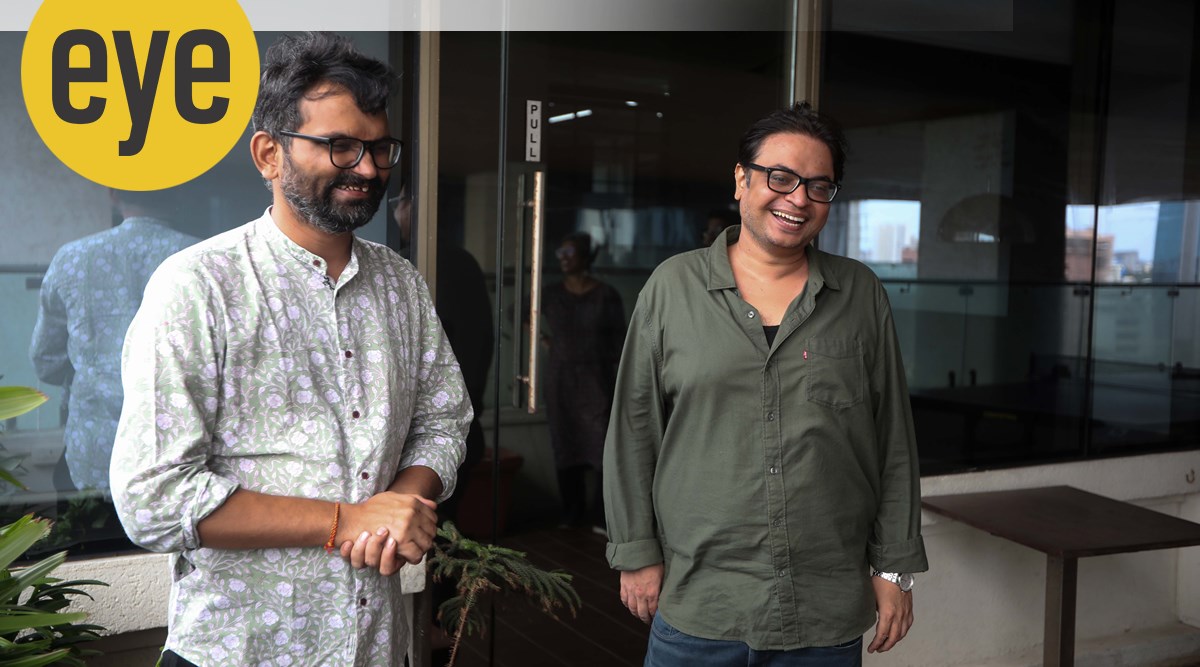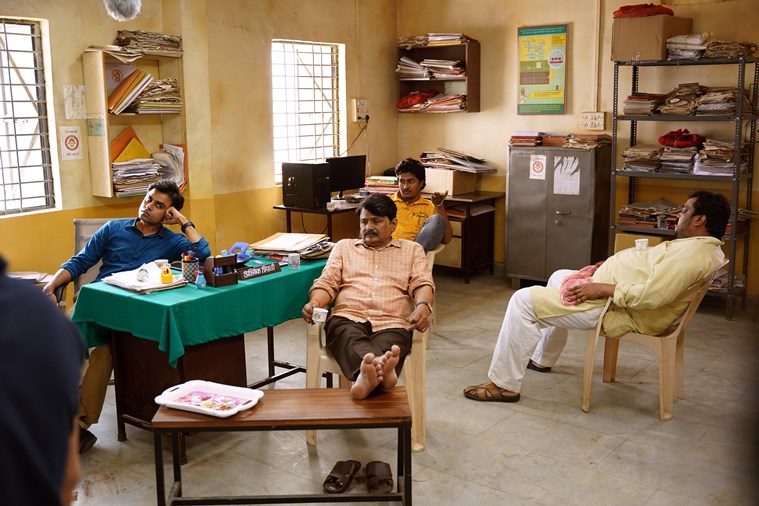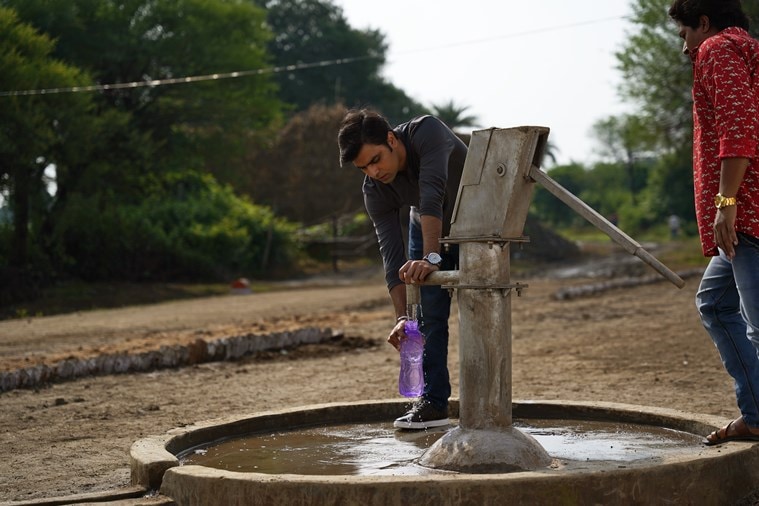 Director Deepak Mishra (left) with writer Chandan Kumar (Credit: Narendra Vaskar)
Director Deepak Mishra (left) with writer Chandan Kumar (Credit: Narendra Vaskar)Slide the puris lower into the oil to get them puffy and full, Neena Gupta advises co-actor Sanvikaa. It was Gupta channeling her improv strengths for the birthday sequence of her on-screen daughter.
This seemingly trivial tweaking by the seasoned actor adds immense value to the storytelling and the world of Panchayat which is based on sharp observations, well-defined characters and riveting performances. “Such an insight could have only come from an actor like Neena ji,” says Panchayat’s director Deepak Kumar Mishra. It’s a worthy reminder of the show’s ethos that says, “Realise your truth”, even as the second episode of Panchayat Season 2, Bol Chaal Band, rolls out. Gupta plays the role of Phulera panchayat’s head Manju Devi, while Sanvikaa is her daughter Rinki.
In this season too, Mishra underlines their ambition to tell “a good story that connects with people” and is endorsed by writer Chandan Kumar.
From the start, Mishra and Kumar — who were flatmates in Mumbai from 2015 to 2000 — were on the same page regarding the world they wanted to showcase. Coming from the heartland, Mishra hails from Varanasi and Kumar from Patna, they wanted to tell stories which were different from the run-of-the-mill gangster and crime sagas set in these areas. “When Chandan first shared his idea of a city-bred youth living in a rural area in 2017, I liked it instantly,” says Mishra.
Subscriber Only Stories
Once they established the show’s premise — an engineering graduate working as a secretary of a Panchayat office as a stopgap measure — it became easier to build on it. Since Kumar was familiar with instances of a female Panchayat head’s husband (informally known as pradhanpati) running the show while the elected representative is caught up with domestic chores, the characters of Manju Devi and her husband Brij Bhusan Dubey (essayed by Raghubir Yadav) became part of the narrative.
When Panchayat Season 1 released on April 3, 2020, it captured the audiences’ attention with its compelling depiction of rural life with all its idiosyncrasies. The new season, released on May 18, 2022, has become even more popular and an endless source of memes. The Panchayat creators still find it incredulous that “a simple story” has received so much love.
 A still from ‘Panchayat’
A still from ‘Panchayat’ Mishra believes that being “rooted”, while keeping the craft in mind, has contributed to its success. Kumar agrees and says, “There is a commonality in the way people in rural India live.” The show banks on gentle satire as it explores the everyday life with lightness and warmth. After CCTVs are installed in the village, a man locates his stray goat with the help of its footages; a snake finds its way into a bucketful of chilled beer bottles on a warm day; and a villager’s act of dissent is the threat to defecate in the open.
Interestingly, Panchayat, which is produced by The Viral Fever, was rejected by a number of streaming video platforms including Hotstar and Netflix, before it was sold as a package deal to Amazon Prime Video along with a big show.
Though Panchayat is set in Phulera, a fictional village of Uttar Pradesh, it is shot in Madhya Pradesh. The team reached the sets with bound scripts, but there was always room for improvisation. “Several factors came together during the making of it. Both Raghubirji and Neenaji are spontaneous actors. They come up with significant inputs. When you have actors who are intelligent, they know how to lift a scene,” says Mishra. That’s why the creators try to make sure casting is perfect. The show’s cast consists of known names from Mumbai as well as actors from Bhopal and Bengaluru.
When the need arises, Mishra doesn’t hesitate to step in as an actor. “During the shoot of Chakke Wali Kursi episode in Season 1, the actor cast as the electrician got nervous. So, I did his part,” says the director, who is an IIT-Bombay graduate and has been working on The Viral Fever shows since 2012. Incidentally, actor Chandan Roy had initially auditioned for the electrician’s role. Impressed with his audition, the team decided to cast him as Vikas, the assistant to Panchayat secretary. With his superb performance as simple-hearted and loyal Vikas, this journalist-turned-actor has won much appreciation.
What makes the characters convincing is that both Mishra and Kumar have experienced rural life. “Though I grew up in Varanasi, for two months in summer I used to live in my grandparents’ village. I hated it then but today I’m thankful to my parents for making me do that,” says Mishra. Though Kumar studied in Patna, he frequently visited his village Siyarampur. A fan of Steven Spielberg, Mishra says: “Going by his philosophy, I believe that nothing should seem unreal. We have left high-paying jobs to become show creators. So, why should we do beimani (be dishonest)?”.
 A still from ‘Panchayat’
A still from ‘Panchayat’ Finalising the story is a “rigorous” process involving a series of narration and feedback sessions. “In the episode Tension in Season 2, the drunk driver in the initial drafts was supposed to be beaten up and chased away. That ending was not satisfying. After a few rounds of back and forth, we arrived at the point when he says ‘bhool-chook maaf kar dena (pardon my mistakes)’ before driving away,” says Kumar.
During the conversation, it is apparent that they deeply love the world they have created. Both choose Computer Nahi Monitor in Season 1, in which a monitor is stolen from the panchayat office, as their favourite. Mishra feels “proud” of the Jaise Ko Taisa episode in Season 2 where high drama unfolds over mistaken switching of chappals while Kumar’s picks the finale, Parivaar. “There is a sudden shift in the tone in the finale as a tragedy strikes. We were wary of it but not scared. We knew this sequence would also work if the previous episodes work,” Kumar says and adds this sequence paves the way for Season 3. They are hopeful of making 10 seasons of the show. “We want Panchayat to be India’s Friends,” says Mishra.
Though they nurse the ambition of making a feature film, they won’t take that step unless they have a great story. “I keep prodding Chandan to write a sci-fi. Once we find a convincing story, we will make an honest effort to tell it,”says Mishra.